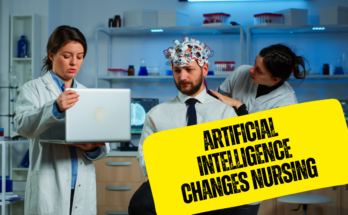AI Virtual Assistants Pioneering Healthcare Solutions
Introduction
AI Virtual Assistant Healthcare has transformed the medical business by providing new solutions to expedite operations, improve patient care, and achieve better results. Understanding the complexities and advantages of AI in healthcare is critical for navigating the changing environment of modern medicine.
What is AI Virtual Assistant Healthcare?
AI Virtual Assistant Healthcare refers to advanced technological systems powered by artificial intelligence that aid healthcare professionals in various tasks, from administrative duties to clinical decision-making processes.
Importance of AI in Healthcare
AI plays a pivotal role in healthcare by optimizing operational efficiency, reducing costs, and augmenting medical capabilities. It enables healthcare providers to deliver personalized care, improve diagnostic accuracy, and enhance patient experiences.
How AI Virtual Assistants Work in Healthcare
AI Virtual Assistants utilize machine learning algorithms and natural language processing to interpret data, analyze patterns, and execute tasks autonomously. These assistants can schedule appointments, retrieve patient information, provide medication reminders, and even assist in surgical procedures.
Applications of AI Virtual Assistants
AI in Patient Care
AI Virtual Assistants facilitate remote patient monitoring, enabling healthcare professionals to track vital signs, detect anomalies, and intervene promptly, thereby improving patient outcomes and reducing hospital readmissions.
Administrative Tasks Automation
By automating administrative tasks such as appointment scheduling, billing, and insurance processing, AI Virtual Assistants allow healthcare providers to focus more on patient care, leading to increased efficiency and productivity.
Diagnostics and Predictive Analytics
AI-powered diagnostic tools can analyze medical imaging scans, laboratory results, and patient histories to assist healthcare providers in accurate diagnosis and prognosis. Moreover, predictive analytics help in identifying high-risk patients and preventing adverse events.
Challenges and Opportunities
Data Privacy and Security Concerns
The widespread adoption of AI in healthcare raises concerns regarding the privacy and security of patient data. Healthcare organizations must implement robust security measures and adhere to strict regulatory standards to safeguard sensitive information.
- Integration and Adoption Challenges
- Opportunities for Improving Healthcare Delivery
| Focus | Identifying barriers to integrating AI Virtual Assistants into existing healthcare systems. | Highlighting the potential benefits and opportunities AI Virtual Assistants bring to healthcare delivery. |
| Challenges | Technical hurdles such as interoperability issues and data integration complexities. Resistance to change and insufficient training among healthcare professionals. | Leveraging AI-driven insights to optimize resource allocation, personalize treatment plans, and enhance patient engagement. |
| Impact on Healthcare Transformation | Hinders the widespread adoption of AI technologies in healthcare settings. | Facilitates the transformation of healthcare delivery by revolutionizing patient care and organizational efficiency. |
| Need for Addressing | Overcoming technical barriers and fostering a culture of acceptance and readiness for AI integration. | Emphasizing the potential positive impact and encouraging proactive adoption strategies within healthcare organizations. |
Future Trends
AI Virtual Assistant Integration in Wearable Devices
The integration of AI Virtual Assistants into wearable devices such as smartwatches and fitness trackers enables continuous health monitoring, real-time feedback, and proactive intervention, empowering individuals to take control of their health.
Personalized Medicine and Treatment Plans
AI algorithms analyze vast amounts of patient data to identify patterns, predict disease progression, and recommend personalized treatment plans tailored to individual needs, thereby optimizing therapeutic outcomes and minimizing adverse effects.
Enhanced Virtual Consultations and Telemedicine
AI-powered virtual assistants facilitate seamless communication between patients and healthcare providers, enabling remote consultations, telemedicine appointments, and virtual follow-ups, thereby improving accessibility and convenience.
Conclusion
AI Virtual Assistant Healthcare represents the future of medicine, offering innovative solutions to address the complex challenges facing the healthcare industry. By embracing AI technologies, healthcare organizations can enhance patient care, improve operational efficiency, and drive better health outcomes for all.
FAQs
What are the primary benefits of AI Virtual Assistant Healthcare?
AI Virtual Assistant Healthcare enhances operational efficiency, improves diagnostic accuracy, and facilitates personalized patient care, leading to better health outcomes.
How secure is patient data in AI Virtual Assistant Healthcare systems?
Healthcare organizations implement robust security measures and adhere to strict regulatory standards to ensure the privacy and security of patient data in AI Virtual Assistant Healthcare systems.
Can AI Virtual Assistants assist in remote patient monitoring?
Yes, AI Virtual Assistants enable remote patient monitoring by tracking vital signs, detecting anomalies, and facilitating timely interventions, thereby improving patient outcomes and reducing hospital readmissions.
What challenges hinder the widespread adoption of AI in healthcare?
Challenges such as data privacy concerns, integration complexities, and resistance to change among healthcare professionals hinder the widespread adoption of AI in healthcare.
How do AI Virtual Assistants contribute to personalized medicine?
AI Virtual Assistants analyze patient data to identify patterns, predict disease progression, and recommend personalized treatment plans tailored to individual needs, thereby optimizing therapeutic outcomes.
What future trends can we expect in AI Virtual Assistant Healthcare?
Future trends in AI Virtual Assistant Healthcare include integration into wearable devices, personalized medicine advancements, and enhanced virtual consultations, revolutionizing healthcare delivery.

